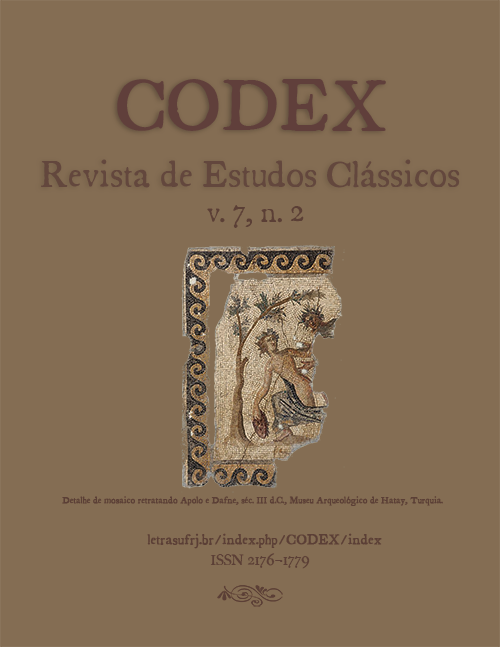Georgic and Kinegetic Elements in Ovid’s Erotodidaxis
DOI:
https://doi.org/10.25187/codex.v7i2.30338Keywords:
Ovid, Roman Erotic Elegy, Erotodidaxis, Agriculture, HuntingAbstract
In this article, we intend to demonstrate the incorporation of thematic elements related to agriculture and hunting into Ovid’s two main erotodidactic poems, the Ars amatoria, and the Remedia amoris. However, this incorporation does not occur in the same way in both texts, for it depends on the adhesion of the works cited to the poetics of Roman erotic elegy. Thus, in the Ars amatoria, hunting and farming take the form of metaphors and comparisons, for the magister amoris teaches “students” to behave, at least superficially, like the lovers (or puellae) found in this poetic genre. In the Remedia amoris, on its turn, where the magister teaches his “students” how to break down romantic relationships that bring them suffering, practical occupations such as farming and hunting take the form of effective directions to be practical, as this favors the liberation of unhappy lovers from an idle existence, which puts them in a vulnerable situation in the face of love.Downloads
References
AVELLAR, Júlia Batista Castilho de. O poeta como leitor de sua obra: a recepção de Ovídio nos Tristia. Itinerários, Araraquara, n. 45, p. 217-234, jul./dez. 2017. Disponível em: <https://periodicos.fclar.unesp.br/itinerarios/article/view/8961> Acesso em: 06/11/2019.
BOUCHER, Jean-Paul. Études sur Properce: problèmes d’inspiration et d’art. Paris: Éditions E. de Boccard, 1965.
BOYD, Barbara Weiden Boyd. Beatus ille qui procul … otiis?: Ovid’s Rustication Cure (Remedia amoris 169–98). In: KNOX Peter; PELLICCIA, Hayden; SENS Alexander (Org.). They keep it all hid: Augustan poetry, its antecedents and reception. Berlin: De Gruyter, 2018, p. 89-100.
CATO; VARRO. On Agriculture. With an English translation by H. D. Hooper. Cambridge (Massachusetts)/London (England): Harvard University Press, 1999.
CONTE, Gian Biagio. L’amore senza elegia: i Rimedi contro l’amore e la logica di un genere. In: CONTE, Gian Biagio. Generi e lettori: Lucrezio, l’elegia d’amore, l’enciclopedia di Plinio. Milano: Arnoldo Mondadori Editore, 1991, p. 53-94.
DEL BAÑO, Francisca Moya. Poesia “menor”: siglos I y II d.C. In: CODOÑER, Carmen. (Org.). Historia de la literatura latina. Madrid: Cátedra, 2007, p. 449-492.
FEDELI, Paolo. Bucolica, lirica, elegia. In: MONTANARI, Franco (Org.). La poesia latina: forme, autori, problemi. Roma: NIS, 1991.
GRATTIUS. Cynegeticon. In: Publilius Syrus et alii. Minor Latin poets: vol. I. Translated by J. W. Duff and A. M. Duff. Cambridge, Mass./London: Harvard University Press, 1982, p. 143-208.
GREEN, Steven J. Grattius and Augustus: hunting for an emperor. In: GREEN, Steven J. (Org.). Grattius: hunting for an Augustan poet. Oxford: Oxford University Press, 2018, p. 153-175.
GRIMAL, Pierre. Virgile, ou la seconde naissance de Rome. Paris: Flammarion, 1985.
HOLZBERG, Niklas. Ovid: the poet and his work. Trad. G. M. Goshgarian. Ithaca: Cornell University Press, 2002.
JALLET-HUANT, Monique. La chasse dans l’Antiquité romaine. Paris:
Éditions de Montebel, 2008.
LEACH, Eleanor Winsor. Georgic Imagery in the Ars amatoria. Transactions and Proceedings of the American Philological Association, Baltimore, v. 95, p. 142-154, 1964. Disponível em: <https://www.jstor.org/stable/283788> Acesso em: 06/11/2019.
OTIS, Brooks. Virgil: a study in civilized poetry. Norman: Oklahoma University Press, 1963.
OVID. Ars amatoria book 1. With a commentary by Adrian Swayne Hollis. Oxford: Oxford University Press, 1977.
OVIDE. L’art d’aimer. Texte établi et trad. par. H. Bornecque. Paris: Les Belles Lettres, 1930.
OVIDIO. L’arte di amare. A cura di Emilio Pianezzola, comento di Gianluigi Baldo, Lucio Cristante, Emilio Pianezzola. Milano: Fondazione Lorenzo Valla/Arnoldo Mondadori Editore, 1991.
OVÍDIO. Os remédios do amor; Os Cosméticos para o rosto da mulher. Trad., introdução e notas de Antônio da Silveira Mendonça. São Paulo: Nova Alexandria, 1994.
PLINY. Epistularum Libri duo. With introduction, notes, and plan, edited
by Janes Cowan. London: Macmillan, 1889.
PUTNAM, Michael. The Carmen Saeculare. In: DAVIS, Gregson (Org.). A Companion to Horace. Malden, MA/Oxford, UK/Chichester, UK: Wiley-Blackwell, 2010, p. 231-249.
THOMAS, Richard F. Virgil: Georgics – v. II, books 3-4. Edited with a commentary by R. F. Thomas. Cambridge: Cambridge University Press, 1997.
TOOHEY, Peter. Epic lessons: an introduction to ancient didactic poetry. London/New York: Routledge, 1996.
TREVIZAM, Matheus. Poesia didática: Virgílio, Ovídio e Lucrécio. Campinas: Unicamp, 2014.
TREVIZAM, Matheus; AVELLAR, Júlia Batista Castilho de. Uma Ars poetica ovidiana: metapoesia e ilusionismos na Ars amatoria. Letras Clássicas, São Paulo, v. 17, n. 2, p. 115-133, 2013. Disponível em: <http://www.revistas.usp.br/letrasclassicas/article/view/118442> Acesso em: 06/11/2019.
TSAKNAKI, Christina. Ars uenandi: the art of hunting in Grattius’ Cynegetica and Ovid’s Ars amatoria. In: GREEN, Steven J. (Org.). Grattius: hunting for an Augustan poet. Oxford: Oxford University Press, 2018, p. 115-131.
VIRGILE. Géorgiques. Texte trad. par Eugène de Saint-Denis. Paris: Les Belles Lettres, 1998.
Downloads
Additional Files
Published
How to Cite
Issue
Section
License
This work is licensed under a Creative Commons Attribution-NonCommercial 4.0 International License.










